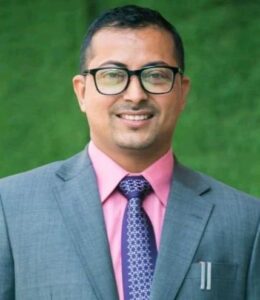Dear Valued Readers and Contributors,
Greetings!
We are pleased to release the second quarterly issue (April-June), 2022 of ELT Choutari believing that the varied resources will benefit you.
We are moving ahead rejoicing the Nepali New Year with new thoughts, aspirations and with enthusiasm. We wish you a happy, productive and historic new year, 2079 B.S. to you and take this moment to thank our readers and contributors for inspiring us in the continuous journey of 14 years.
The world is constantly changing and the classroom pedagogies, teaching-learning principles and practices, research and resources should also change with the rhythm of time. Rationalizing this belief, Choutari explores resourceful ideas and pedagogical innovations and presents you in the form of articles, blogs, reviews, interviews, reflections, scholarly ideas, glocal practices, and indigenous knowledge to broaden our academic horizon.
Every classroom is diverse, so the educators in this millennium expect/are expected to be abreast with recent and relevant materials/resources for effective teaching-learning. We believe that the resources and materials shared on our forum can support you to be abreast in your field and contribute in your continuous professional development. Besides, writing your experiences/reflection and sharing your perspectives and scholarly ideas is another great tool for professional development. So, we encourage and welcome your writing/composition on the contemporary educational/linguistic issues, pedagogical practices and most importantly your teaching stories.
In this non-thematic issue, we present you the scholarly ideas, educators’ experiences and reflection and pedagogical practices useful for teaching, writing, researching, critiquing and professional development. We are hopeful that the ideas are replicable in our English language teaching-learning context. So, there are six articles and an exclusive interview in this issue.
In a conversation with Jeevan Karki, Dr Bal Krishna Sharma unfolds the global discourse in ELT, (Second) language acquisition, English language teaching in multilingual contexts, critical language teaching, English language policy and practices in Nepal.
Dr Padam Chauhan in his article ‘Ethnography of Writing: A Basic Framework to Introduce Academic Writing to ESL University Students’ recounts the challenges faced by English as a second language (ESL) first-year academic writing students in university. He highlights the linguistic, cultural, and instructional differences between the US education system and students’ home countries to highlight the educational, social, and cultural contexts in international higher education.
In the same way, Ganga Laxmi Bhandari in her article ‘Mother Tongue as a Resource in the EFL Classroom’ argues for the use of L1 in L2 classroom and believes that L1 not only creates the foundation for a better understanding in L2 learning but also develops a positive attitude among children towards their schools and L2 (Savage, 2019). She further argues that the English-only approach has been a failure; therefore, educators should adopt bi/multilingual approaches for effective language teaching-learning.
Likewise, Shaty Kumar Mahato, in his article ‘Teachers’ Collaboration for Teachers’ Professional Development’ reflects his experiences of professional development (PD) through personal and professional initiatives in the context of Nepal. He argues that teachers’ collaboration is paramount for professional development and engagement with different organizations like NELTA, BELTA and so on can also enhance teachers’ PD.
Similarly, Nanibabu Ghimire, in his blog piece, ‘Reading Among Under-graduate Students: Problems and Ways Forward’, brings on spotlight the reading struggles of under-graduate students and offers some practical ways for advancing reading skills.
Similarly, Bishnu Karki in his article ‘Exploring Creative Response in ELT: A Vignette of an English Teacher’ reflects on the writing strategies he adopted while teaching students in Nepal. He emphasizes on the innovative roles of teachers to explore creative responses in EFL classrooms. Karki, further argues that the teachers in the 21st-century classroom to be creative, cooperative and responsive to cope with the ongoing trends and shifts their profession.
Finally, Satya Raj Joshi in his article ‘Using a Story in Language Teaching: Some Practical Tips’ presents the fundamentals of literature in language classrooms and connects his experiences of language teaching through literature. He argues that the literature is a resource offering multiple ideas and activities for students which help them to develop skills and strategies applicable within and beyond classrooms.
For your ease of access, below is the list of hyperlinked articles:
- Conversation with Dr. Bal Krishna Sharma- English and New Englishes in Multilingual Context: What’s Been Gained and Forgotten?
- Ethnography of Writing: A Basic Framework to Introduce Academic Writing to ESL University Students’ by Dr. Padam Chauhan
- Mother Tongue as a Resource in the EFL Classroom’ by Ganga Laxmi Bhandari
- ‘Reading among Graduate Students: Problems and Ways Forward’ by Nani Babu Ghimire
- Exploring Creative Response in ELT: A Vignette of an English Teacher’ by Bishnu Karki
- Teachers’ Collaboration for Teachers’ Professional Development’ by Shaty Kumar Mahato
- Using a Story in Language Classroom : Some Practical Tips by Satya Raj Joshi
Finally, we would like to thank all our editors, Mohan Singh Saud, Jeevan Karki, Karuna Nepal, Nani Babu Ghimire, Ekraj Koirala, Jnanu Raj Paudel and reviewers Dr Karna Rana, Ashok Raj Khati, Rajendra Joshi and Babita Chapagain for their tireless effort in reviewing these papers. Most importantly, we are indebted to all the contributors to this issue.
If you enjoy reading these blog posts, please feel free to share in and around your circle, and of course, drop your comments in the boxes below. Likewise, please write and send us your teaching-learning experiences for which we will be happy to provide a platform at Choutari. Our email is 2elt.choutari@gmail.com
Happy Reading!
Happy New Year, 2079

Lead-editor: Ganesh Kumar Bastola

Co-editor: Sagar Poudel